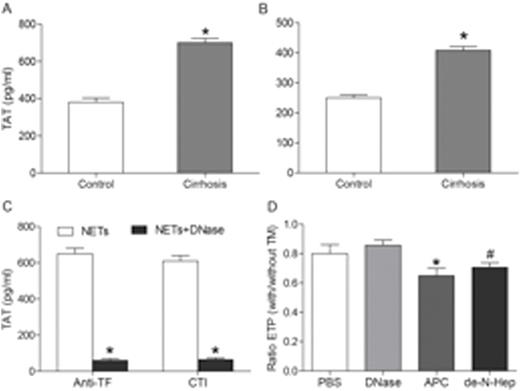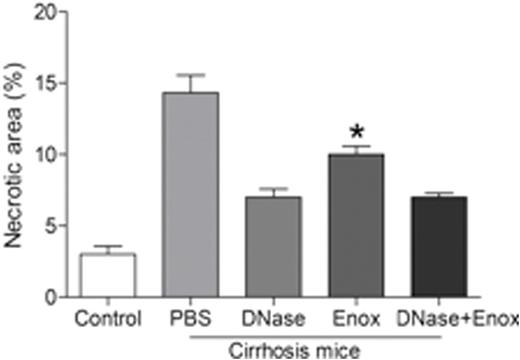Abstract
Background: We recently reported that phosphatidylserine on blood and endothelial cells played an important role in the hypercoagulable state of liver cirrhosis (Wu et al, Liver Int 2016). Recent studies showed that enoxaparin could reduce the incidence of portal vein thrombosis and alleviate liver decompensation. Thus, we speculate that there may be other mechanisms involved in the hypercoagulability of cirrhosis. Neutrophil extracelluar traps (NETs) play an important role in thrombosis and organ dysfunction. Whether the benefit of enoxaparin is due to inhibiting NETs in cirrhotic patients remains unknown. Our objectives were to study the formation of NETs and their role in the hypercoagulable state and liver damage in cirrhotic patients.
Methods:Cirrhotic patients (n = 36), healthy controls (n = 10), and mice treated with CCl4 (n = 50) were studied. Immunofluorescence confocal microscope was used to analyze and quantify NETs formation in neutrophil cells from human and mice. TAT and fibrin formation assays in normal and cirrhotic plasma were performed to analyze the procoagulant activity of NETs. Calibrated automated thrombography (CAT) was performed with and without 6 nM thrombomodulin I to analyze TM resistance changes induced by NETs. Liver injury was assessed by plasma alanine aminotransferase (ALT) and aspartate aminotransferase (AST) activity, determined spectrophotometrically, and by morphometric evaluation of left lateral liver lobes. DNase I and activated protein C (APC) were used to abolish NETs.
Results: We observed that cirrhotic platelets induced 1.9 fold higher NETs formation in neutrophil cells (p = 0.021). Increased NETs promoted higher TAT (Fig 1A, B) and fibrin formation in normal and cirrhotic plasma (p < 0.05). DNase I abolished the procoagulant activity of NETs in corn trypsin inhibitor (CTI ) or anti-TF pre-treated plasma (p < 0.001) (Fig 1C). TM pre-induced with NETs for 24 h showed a higher endogenous thrombin potential (ETP) than no treatment in normal plasma using CAT (p = 0.032). APC and de-N-sulfated heparin (de-N-Hep), but not DNase I, can decrease the ETP ratio (with/without TM) in cirrhotic plasma (p < 0.05) (Fig 1D). Mice treated with CCl4 showed a higher ALT, AST, necrotic area (Fig 2), and NETs formation than control (p < 0.05). DNase I and enoxaparin decreased ALT, AST, necrotic area (Fig 2) and NETs formation (p < 0.05).
Conclusions:Cirrhotic patients have enhanced NETs formation compared to healthy controls. NETs initiated intrinsic and extrinsic coagulation pathway and impaired anticoagulant function of TM. Additionally, NETs partly contributed to tissue injury in the liver of cirrhotic mice. DNase I and enoxaparin can disconnect NETs and decreased the toxin to liver.
Neutrophil extracelluar traps (NETs) were isolated and incubated with plasma from healthy controls (A) or cirrhotic patents (B). TAT complexes were measured by ELISA. (C) TAT complexes formation of NETs were analyzed in normal plasma pre-treated with corn trypsin inhibitor (CTI ) or anti-TF in absence or presence of DNase I. (D) Calibrated automated thrombography was performed with and without 6 nM thrombomodulin (TM) in cirrhotic plasma. APC, activated protein C; de-N-Hep, de-N-sulfated heparin. *p < 0.05 vs. Control in figure A, B; *p < 0.001 vs. NETs in figure C; *p = 0.008 and #p = 0.039 vs. PBS in figure D.
Neutrophil extracelluar traps (NETs) were isolated and incubated with plasma from healthy controls (A) or cirrhotic patents (B). TAT complexes were measured by ELISA. (C) TAT complexes formation of NETs were analyzed in normal plasma pre-treated with corn trypsin inhibitor (CTI ) or anti-TF in absence or presence of DNase I. (D) Calibrated automated thrombography was performed with and without 6 nM thrombomodulin (TM) in cirrhotic plasma. APC, activated protein C; de-N-Hep, de-N-sulfated heparin. *p < 0.05 vs. Control in figure A, B; *p < 0.001 vs. NETs in figure C; *p = 0.008 and #p = 0.039 vs. PBS in figure D.
The necrotic area of liver tissue in control mice, cirrhotic mice treated with PBS, DNase I, enoxaparin or a combination of DNase I with enoxaparin. Enox, Enoxaparin. *p < 0.05 vs. PBS
The necrotic area of liver tissue in control mice, cirrhotic mice treated with PBS, DNase I, enoxaparin or a combination of DNase I with enoxaparin. Enox, Enoxaparin. *p < 0.05 vs. PBS
No relevant conflicts of interest to declare.
Author notes
Asterisk with author names denotes non-ASH members.



This feature is available to Subscribers Only
Sign In or Create an Account Close Modal